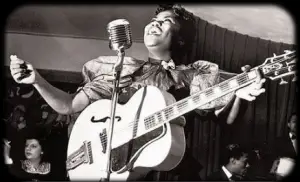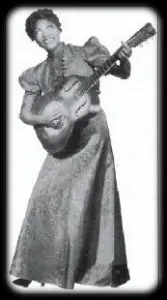SISTER ROSETTA THARPE
 Sister Rosetta was a sanctified Gospel singer who caused consternation among the flock by appearing in theatres and nightclubs, singing the Blues. She was a glorious sight to behold in her smart dresses and high heels as she toted her electric guitar like a Tommy-gun, spattering Blues licks around her audience like red-hot bullets.
Sister Rosetta was a sanctified Gospel singer who caused consternation among the flock by appearing in theatres and nightclubs, singing the Blues. She was a glorious sight to behold in her smart dresses and high heels as she toted her electric guitar like a Tommy-gun, spattering Blues licks around her audience like red-hot bullets.
Rosetta was the daughter of ‘Mother Bell’, a gospel shouter and travelling missionary, and the six-year-old Rosetta would sing and play guitar as part of the service. When the family moved from rural Arkansas to Chicago in the 30s, she would have heard the Blues all around her and incorporated it in her style.
The sister was not troubled by self-doubt!
 When she moved to New York in 1938, it was to be a big year for Rosetta; she appeared at Carnegie Hall at the ‘Spirituals to Swing’ Concert; she played the Cotton Club and The Café Society, and she signed for Decca Records. She recorded sanctified songs like ‘Precious Lord’, ‘Rock Me’ and ‘This Train’ by Rev. ‘Georgia Tom’ Dorsey but maintained a separate, secular career by selling truck-loads of copies of ‘Down By the Riverside’ and sharing a stage with Cab Calloway. During the War years, Rosetta recorded ‘V-discs’ to be sent abroad to the troops; toured with The Dixie Hummingbirds; fronted Lucky Millinder‘s Orchestra and formed an enduring working relationship with boogie-woogie pianist Sammy Price. In the late 40s, she recorded several straight Blues duets with Marie Knight and their debut record, ‘Up Above My Head’ was a huge hit. Rosetta arranged her third marriage, to her manager Russell Morrison, as a concert event and 25,000 people attended the combined service and concert at a Washington DC sports arena. Her gospel audience was outraged that she had crossed into the mainstream and her gospel record sales and concert appearances slowed to a trickle. Rosetta arranged a year-long tour of Europe, hoping her absence would calm the rancour and that the power of her voice and playing would speak for themselves on her return. The strategy worked, but slowly.
When she moved to New York in 1938, it was to be a big year for Rosetta; she appeared at Carnegie Hall at the ‘Spirituals to Swing’ Concert; she played the Cotton Club and The Café Society, and she signed for Decca Records. She recorded sanctified songs like ‘Precious Lord’, ‘Rock Me’ and ‘This Train’ by Rev. ‘Georgia Tom’ Dorsey but maintained a separate, secular career by selling truck-loads of copies of ‘Down By the Riverside’ and sharing a stage with Cab Calloway. During the War years, Rosetta recorded ‘V-discs’ to be sent abroad to the troops; toured with The Dixie Hummingbirds; fronted Lucky Millinder‘s Orchestra and formed an enduring working relationship with boogie-woogie pianist Sammy Price. In the late 40s, she recorded several straight Blues duets with Marie Knight and their debut record, ‘Up Above My Head’ was a huge hit. Rosetta arranged her third marriage, to her manager Russell Morrison, as a concert event and 25,000 people attended the combined service and concert at a Washington DC sports arena. Her gospel audience was outraged that she had crossed into the mainstream and her gospel record sales and concert appearances slowed to a trickle. Rosetta arranged a year-long tour of Europe, hoping her absence would calm the rancour and that the power of her voice and playing would speak for themselves on her return. The strategy worked, but slowly.